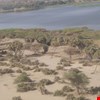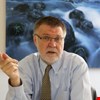


GWP-CAf Staff made a four days working visit to the Executive Secretariat of Lake Chad Basin Commission (LCBC), which took place from 22 to 25 of March 2016, in Ndjamena, Chad.
The main objective of this visit was to finalize the ToRs and tender document for the development of a project on the establishment of an Early Warning System. The visit ended with the approval of the Terms of Reference (ToR) of the project entitled “Strengthening Climate Information and Early Warning Systems (EWS) for Climate Resilient Development and Adaptation to Climate Change in the Lake Chad Basin area”.

Last year a group of youth from more than 20 countries started a global initiative where they produced a white paper in the lead up to COP21, which allowed for a Youth Commitment under the Lima-Paris Action Agenda. GWP and partners are now taking the next step in launching a youth portal, where the voices of the young people will be gathered in one place. The portal is launched on World Water Day, 22 March.

The Executive Secretary of GWP, Rudolph Cleveringa, says that GWP as a network needs to change: “We can’t use the same agenda as we did 20 years ago”. Approaching World Water Day 2016, Cleveringa takes a moment to reflect on GWP’s 20 years in the water world and talks about his vision on how to make the network fit for the future – local inclusion and diversity are words he uses to make his point.

The United Nations’ (UN) International Women’s Day is observed on March 8th each year. It’s a day to “celebrate the social, economic, cultural and political achievement of women.”
Under Water and Climate Development Programme (WACDEP), Myanmar WACDEP activity title is Development of the National Water Policy and Water Law with Integrating Water Security and Climate Resilience Aspects into Investment Planning and Decision Making Process. Its goal is to point out the integration of water security and climate resilience aspects to be included in the national water policy and water law.
With aiming the goal of the activity, the works have been initiated with making two assessment studies: Assessment of the National Water Policy of Myanmar (NWPM) and Assessment of the Current Situation of Water Security and Climate Resilience Aspects in Myanmar. After that, identification of these aspects to be integrated in NWPM, how to implement the integration process by means of consultative meeting which will be held among multi-stakeholders from water sector. Finally, selecting and prioritizing the action plans for integrating water security and climate resilience aspects into the NWPM.
To implement the one of action plans as a pilot study which has been selected from already identified National Adaptation Programs of Actions (NAPA). It is selected from water resources sector according to the prioritization of NAPA action plans. Accordingly, selection has been done for a particular area region within the country for pilot study to develop regional rainfall-runoff relationships. For that, Magwe Region has been selected for pilot study and collecting available data including historic records for rainfall and runoff data of streams that are situated in the region. Based on these collected data, regional rainfall and runoff relationships will be developed and these relationships will be given as input to identify and support the country flood early warning system establishment to be able to ensure and making decision for sustainable water management

More than 80 Members of Parliaments (MPs), journalists, country administrators, intergovernmental organisations, NGOs, and private partners from 16 countries contributed to a regional workshop dedicated to climate change adaptation in coastal areas of the Mediterranean (5-6 November 2015, Athens).

The MedPartnership and ClimVar projects held their final meeting on 3-4 November 2015 in Athens, Greece to showcase the results achieved through the activities and demonstration projects implemented over the past five years or so aiming to address the main environmental challenges that Mediterranean marine and coastal ecosystems face.

GWP-Med provides technical assistance to the UfM secretariat that coordinates/supports the drafting procedure of a roadmap and associated work plan for the work of the WEG.

Sustainable Water Integrated Management – Support Mechanism (SWIM-SM), the largest water-related regional project supported by the European Commission (EC) during 2010-2015, successfully concluded its phase I, and held its Final Steering Committee (SC) Meeting in Luxembourg, on the 25th of November. With a budget of 7.7 million Euros, the project was implemented in nine south Mediterranean countries[1] by a consortium led by LDK and with GWP-Med as the project technical director.